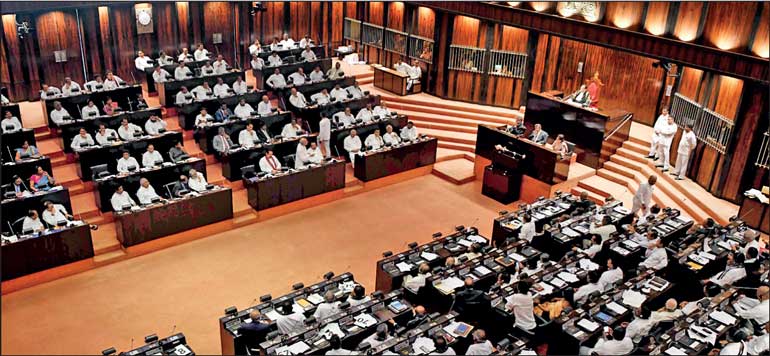Friday Feb 27, 2026
Friday Feb 27, 2026
Friday, 5 April 2024 00:28 - - {{hitsCtrl.values.hits}}

It appears that there is unanimity in the public perception of an overwhelming number of Sri Lankans that Sri Lanka has gone beyond the point of resurrection when it comes to immorality, unethical behaviour, corruption, lack of law and order and poor governance
 “Political ethics requires leaders to meet higher standards than would be necessary for private life. They may have less of a right to privacy than ordinary citizens do, or no right to use their office for personal profit. Personal or private morality and political morality are often viewed as a conflict of interest” – Andrew Stark, Conflict of Interest in American Public Life. (Harvard University Press, 2003)
“Political ethics requires leaders to meet higher standards than would be necessary for private life. They may have less of a right to privacy than ordinary citizens do, or no right to use their office for personal profit. Personal or private morality and political morality are often viewed as a conflict of interest” – Andrew Stark, Conflict of Interest in American Public Life. (Harvard University Press, 2003)
A senior politician said recently that he would like the SLPP, SJB, UNP and the NPP to work together. Of course, working together does not necessarily mean entering into political coalitions. So far, efforts made by President Ranil Wickremasinghe for political parties to work together on a common program, especially an economic program, has not materialised and all Opposition parties have declined to work together with the government on such a program. Working together on a common program without political coalescing requires personal sacrifices on the part of politicians as a common program has no personal political winners and losers. There can be only one winner, and that is the country.
On the other hand, political coalitions are power sharing models which are not necessarily altruistic models where the interest of the country supersedes personal interests. Politicians are interested in power and the public should not fool themselves and not allow them to be fooled by others who would like the public to believe in an imaginary world of working together for the sake of the country and the betterment of the country.
In the context of pursuit of power, and the justification of any means to achieve some political ends including engaging in corrupt activity and unethical behavior, the following three quotes by Mahatma Gandhi are of relevance today in Sri Lanka on the eve of presidential and general elections to be held in 2024 and 2025.
Mahatma Gandhi epitomised the need for leaders to adhere to core human values of honesty, decency, love and kindness and service to each other. He did his utmost to change the political culture of India for it to reach its goals within the parameters of these core values.
Present political culture is sullied
Many believe, genuinely in most cases, that the political culture of Sri Lanka has to change as the present political culture is so sullied and a new breed of politicians are needed to resurrect something out of the mud everyone is in. It is uncertain though whether those who vocalise the need for a change in the political culture in fact are willing or even able to change it as they are representing a public who themselves appear to have distanced themselves from these core values. Religions have become so institutionalised, the teachings of the founders of religions have been overshadowed by ritualism that has no bearing on these core values.
The culture of a country plays a significant role in shaping its political system. A culture encompasses the attitudes, beliefs, and values that individuals have and hold towards each other in a society. A political system does not evolve by itself but from these attitudes, and the quality of a political system has a direct relationship to the quality of the country’s culture, therefore the values of its people. Mahatma Gandhi and leaders like Nelson Mandela, Martin Luther King Jr, were living embodiments of such values during their political struggles and these served to guide the destiny of their political movements.
Transfer of values and beliefs from one generation to another happens through political socialisation, and this is a crucial factor in shaping the evolving political culture of a country. Various social institutions such as the family, education, religion, political parties, and media contribute to the formation and construction, and the evolution of political cultures. The development of political cultures is influenced by the changes in political consciousness and behaviour, as well as the values and attitudes prevailing in society.
In theory, political coalitions are welcome as an instrument to increase wider participation of those with diverse opinions on political governance and lessen tensions and inequities that lead to an uncompromising political culture often leading to extremism. However, if coalitions are entered into without any desire or intention of changing a political culture that is sullied with immorality, unethical behaviour, abject corruption and lack of any political standards, such coalitions will only lead to a country falling from a frying pan to a fire in respect of unjust, inequitable governance devoid of any morality and ethics.
Beyond the point of resurrection
It appears that there is unanimity in the public perception of an overwhelming number of Sri Lankans that Sri Lanka has gone beyond the point of resurrection when it comes to immorality, unethical behaviour, corruption, lack of law and order and poor governance. Paraphrasing Albert Einstein, they also appear to believe that it would be madness and suicidal for the country if the same people are elected to govern in the same way expecting different results. In such a climate, political coalitions formed for the sake of just power are bound to keep a lid on all these negatives and would be a means of perpetuating them as coalition agreements are bound to shield the corrupt and the dregs of society.
The problem for the country however is that those who are offering a new way of governance have not, as yet produced a document that outlines how they would govern differently and address the ills of the political culture and shortcomings in governance in the country. The absence of a specific, realistic plan of action to address these is a serious drawback to the country as any political combination riding the crest of a wave of popularity arising solely from the unpopularity of others, will not be any kind of panacea to address the ills facing the country. There is also the inherent consequential danger of what might happen if such a group fails to deliver on promises made on political platforms and on media interviews. Such a danger is even more acute if such a group, with a record of serious, series of violent political struggles, which they have not rejected as a possible weapon to gain power should a need arises for that, gains power simply on promises but not specific realistic solutions.
The oncoming elections, Presidential and General, pose a significant challenge for the future of the country. They will be called upon to decide between a popular group that has not presented any specific written plans as to how they would govern should they win one or both elections, and possibly a coalition of political parties opposed to the popular group, but who may coalesce just to oppose the popular group and to pursue power for themselves. It is highly unlikely that such a coalition will be able to change the sick political culture of the country as their coalition agreements will shield the many perpetrators who are in abundance in every party.
None of the Opposition parties have so far presented a realistic plan to the people as to how they would reduce the debt of the country which now exceeds the GDP of the country. The debt to GDP ratio stands at 120% now. In laymen’s terms this means that even if the entire country is sold today at its GDP value, it will still owe 20% of its value (GDP). None have presented specific alternate plans as to how the country could live within its means without resorting to more borrowings. None have spelt out the way they would settle outstanding foreign debt of some USD 52 Billion. None have spelt out a plan as to how they would change the political culture of the country and bring back morality, ethics, equitable law and order and address corruption that appears to be beyond a stage 4 cancer now. None have spelt out specific plans as to how they would reduce the ever-widening gap between the haves and the have nots.
Promises made on political platforms and media interviews dot the political landscape today. One is reminded of a quote from Nikita Khrushchev, one time Soviet Union Prime Minister that politicians are the same all over. They promise to build bridges even when there are no rivers.